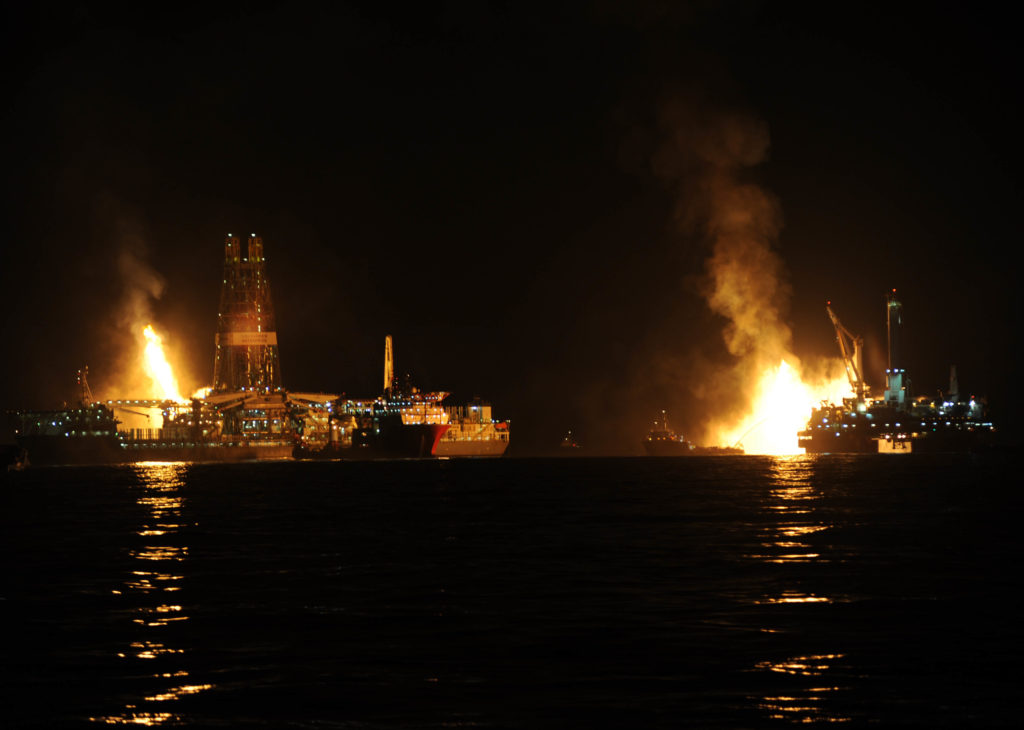A Permanent Moratorium.

 It should be blatantly clear at this stage of the Deepwater Horizon tragedy that we are witnessing the failure of an entire system, rather than of one operator. Systemic solutions are therefore required. One obvious first step is a permanent moratorium on all offshore drilling—a model of energy extraction which the industry is unable to safely perform and the government is unable to adequately regulate.
It should be blatantly clear at this stage of the Deepwater Horizon tragedy that we are witnessing the failure of an entire system, rather than of one operator. Systemic solutions are therefore required. One obvious first step is a permanent moratorium on all offshore drilling—a model of energy extraction which the industry is unable to safely perform and the government is unable to adequately regulate.
In the last five years alone, there have been, just in the Gulf of Mexico, 400 offshore safety and environmental incidents, including blowouts and other major accidents, according to a Houston Chronicle analysis. BP is the leader with forty-seven violations, Chevron is second at forty-six, and Shell is third at twenty-two.
Among the unifying features of these incidents is the failure of the U.S. Minerals Management Service to act. The MMS failed to travel to one-third of the accident scenes, collected only sixteen fines out of 400 incidents, and did not investigate every blowout, as their own rules require.
Transocean, the company that owned and operated the Deepwater Horizon drilling rig, is another common thread. Transocean is the largest deep-water driller in the Gulf of Mexico, operating nearly half of all the rigs in the Gulf that work in more than 3,000 feet of water. It is the company of choice for industry leaders, including Chevron and Exxon, even though, according to a recent Wall Street Journal analysis, nearly three of every four incidents that triggered federal investigations into safety and other problems on deepwater drilling rigs in the Gulf since 2008 have been on rigs operated by Transocean.
The companies also all use the same grossly negligent subcontractor, the Response Group, to write their disaster “preparedness” plans for their Gulf operations. On June 15, Congressman Ed Markey, chair of the House Subcommittee on Energy and the Environment, revealed that all five of the major oil producers in the Gulf of Mexico—BP, Chevron, Exxon, ConocoPhillips, and Shell—used the virtually identical, tragically inadequate disaster plan on how they would handle a spill at their Gulf operations.
The plan, required by the MMS prior to approval for drilling, includes glaring errors and omissions that “vastly understate the dangers posed by an uncontrolled leak and vastly overstate the company’s preparedness to deal with one,” reports AP.
Three of the companies’ 2009 plans, including BP’s, listed as a consultant biologist Peter Lutz, who died in February 2005. Four ensured that their plans addressed the need to protect walruses, sea lions, and seals, although none of these live in the Gulf, revealing that the reports were not only cut and pasted between the companies, but also likely originally written for Arctic operations. Most importantly, the plans absolutely do not work, as BP’s response to the Deepwater Horizon explosion has made horrifically clear. Nonetheless, each and every plan received the government’s approval.
Perhaps more disturbing, however, is Markey’s response: token recommendations for lifting the liability cap on oil spills, requiring that oil companies pay more in royalties, implementing new safety reforms, and developing new technologies for capping wells.
In 1981, a federal moratorium on all new offshore drilling off the Atlantic and Pacific coasts and parts of Alaska was implemented. It was a direct response to the 1969 Unocal offshore oil rig blowout that released three million gallons of oil into the Santa Barbara Channel of California.
BP’s Deepwater Horizon tragedy is far worse, and far from an isolated incident. All around the world, every day, offshore rigs leak and spill. They far too often kill workers, release deadly toxins, produce methane, pollute the air and water, and destroy fisheries and livelihoods.
The oil industry has chosen to blatantly and disdainfully thumb its nose at the government’s regulatory authority, while the government has chosen to be an all-too-willing rubber stamp, demonstrating that it has neither the capability nor the will to regulate this industry. As it was in 1981, a moratorium is the only logical response.
Another key moment in U.S. oil history offers further solutions: the 1911 breakup of Standard Oil. The oil giant became too large for the government to regulate. In response to a massive people’s movement that built from the most local levels and reached the Supreme Court, Standard was broken into thirty-four separate corporate parts. Ultimately, the final step will come when we have retired the oil industry altogether once and for all.
